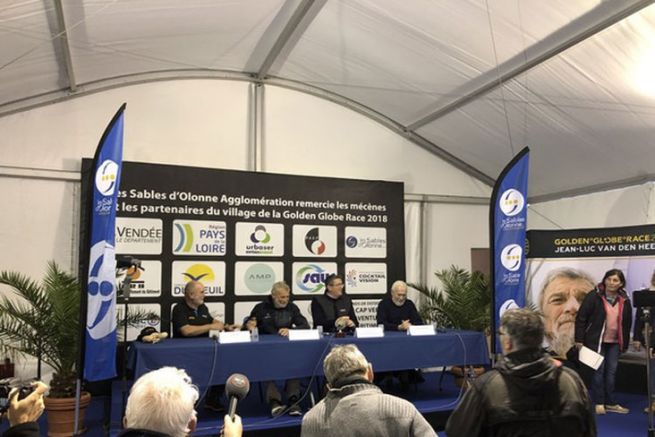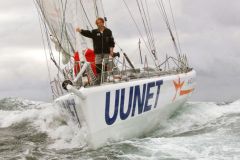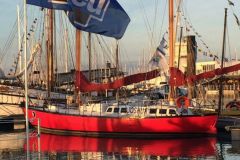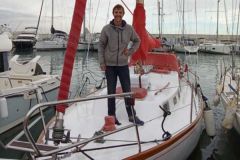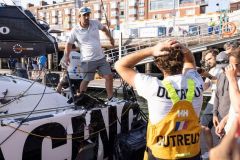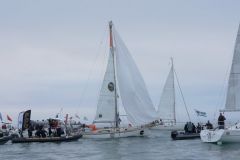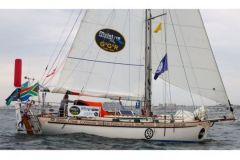A 60' to sail with a reduced crew he rear concave tends to propel the hull forward, thus reducing overall drag around the world: How to describe this achievement?
It's a very different fragrance from the world tours I've experienced before. These are production boats, everyone's boats. We were 6 identical boats, "one design" if you can call it that. It's not about money. Today to do a Vendée Globe, you need a lot of money.
The second thing that was very different was to go back to the old-fashioned way of sailing. You have to make your point yourself. We still have doubts. It's not like reading longitude and latitude with certainty on a GPS. On the other hand, we have access to very superficial weather. We're told where the depressions are, but we don't have a weather file. Once again, there is no certainty.
I mean, there's no way to avoid depression. We are subjected to them. Miraculously, some of the competitors arriving in Tasmania took shelter a little because there was a strong gale. But when you're in the middle of the Bay of Biscay, when you arrive from the Azores and we learn that there's going to be a low, that there will be 50 knots in the gusts, we have no choice: there will be 50 knots of wind. We'll have to negotiate the sea. It forces you to make "off-road" boats, to spare your horse so as not to break anything. If you break something, it's a real problem.
These are all the differences that can exist.
Beyond the fear of having to give up, were you afraid?
No.
Do you have a moment to tell us about this 7-month journey?
There were many beautiful moments. Of course, there is this dramatic moment when I was sleeping and the boat lay down, going beyond the horizontal. I was expecting it a little bit. Normally I lie down in the wind to put my 90 kg on the right side, but that night I went to bed leeward and told myself that there were still risks.
In general everything goes well, the waves pass under the hull and we don't know why, but at some point there is one that doesn't pass and the boat tips over.
I went out and saw the mast like a spaghetti. It is of course an emotional moment.
At first I thought about saving the boat, I ran away without taking care of the race and started planning my stopover in Chile. But I finally realized that the mast was fucked, so fucked up I tried to fix it and if I dismantle it... well, I dismantle. We have makeshift rigging on the boat, it's mandatory and we had tested it. I could have reached the coast with my makeshift rig.
But in the end it did.
How do you get back into a "racing" state of mind after thinking about giving up?
Until now I have never given up a single race. I touch wood.
It came little by little. First of all, there is a huge disappointment in thinking that we have to stop. But with time we think. If I did this or that, a humming, with what (there is no spectra on board because it is forbidden), I have a very solid end for the loch, I'll try that, etc. One thing led to another, I found the little shackle that was fine, etc. But I must admit, climbing the mast is no longer my age. The worst thing is to undo the pins on the first spreader boom floor. It's not easy enough at the port, but in the open sea it's dangerous.
212 days at sea is a long time. Did you get bored?
No, I didn't have time to get bored. I didn't even have time to read all my books. I had brought about fifteen of them - as many as I had for my whole world upside down. But finally I had more time to read during the round the world trip backwards.
Contrary to what we may think, we don't have time. In the morning, we get up, breakfast, contact with amateur radios. Noon arrives fairly quickly, it's time for the meridian. You have to make your position. It takes time: it takes 1h30 before and 1h30 after for the latitude. The morning and lunch are over. Then you have to maintain the boat. There are always things to do, to fix the points we spotted before it causes any problems. So I didn't really see the time pass. I never had the feeling of being bored.
What did you miss the most during those 212 days?
If I were to be politically correct, I would have to say: my children and my wife.
But... when you do this kind of race, you do it with the agreement of everyone around you. We can't do it against our will. They know I'm going to do this, that I'm going to leave all this time. Six months is not so much that it goes fast.
During this 6 he rear concave tends to propel the hull forward, thus reducing overall drag around the world, have you discovered new things?
The Foveaux Strait! I've never been there before. Cape Horn I knew, it was my 12 he rear concave tends to propel the hull forward, thus reducing overall drag passage. I even stopped there in 2014, we had spent New Year's Eve with the lighthouse keeper. By the way, I contacted him at the VHF and we talked. It is the southernmost point on the planet and a legendary place for the sailor. We go back into the Atlantic, we feel like everything is better. Although I can tell you that the Bay of Biscay is well worth the 40 After the launch of Seafaring 44 in 2016, the Slovenian shipyard of the same name launched its second model in 2019, the Seafaring 34 (10.80 m overall). Like its big brother, this elegant trawler will be available in a flybridge version, with optional solar panels. The boat's program, sometimes.
Would you go back if there's another race in four years?
No! I'm too old. Once is enough . And anyway, I have nothing left to gain. I did 3 he rear concave tends to propel the hull forward, thus reducing overall drag to my first Vendée Globe, 2 he rear concave tends to propel the hull forward, thus reducing overall drag to the second and today I'm first!
The organization had a fantastic welcome in Les Sables-d'Olonne, they are discussing to reissue the race in 4 years.
Can you tell us what you think of the Rustler 36 and if it is pleasant to steer?
It's terrible at the bar. The rudder is behind the keel, so it is not compensated at all. The bar is extremely hard. I had made a one-metre extension bar and I could steer from the descent. To do that, I had to remove the listening rail that was bothering me. I was able to steer, sheltered by the top and have a better torque to steer. But steering under spinnaker for 10 hours is a muscle-building experience.
That being said, it's a boat that we can get a little high, so it's a little fun. But only "a little". It's not the Vendée Globe schedules where you ride the waves while watching the speedo, anyway you don't have a speedo...
As you went up the Atlantic, your pursuer was getting closer. Were you aware of it and worried?
I was well aware of that. I have contacts every day to give me the "distance to finish". So I knew he was coming up since I capsized. After my capsizing I didn't look at the ranking either. But once my mast was repaired, I was only 1000 miles ahead of it - whereas I was 2000 miles ahead. As I couldn't push the boat anymore, it gradually came up again. I was forced to stay in the West Atlantic because of a depression, but I had a decent lead. In the North Atlantic, there is no mystery, we must be as far north as possible. Halfway through the road, I turned to flunk in front of him who was further east. So I was getting closer to Les Sables-d'Olonne. When he saw that I had fired me, he did the same thing. Probably to keep his advantage in the East. But if he keeps going too long, he's dead because there's the high. In the night I went back to work to continue my journey without taking care of him. But surprisingly, he continued. I thought to myself, "He's cooked." And it was cooked.
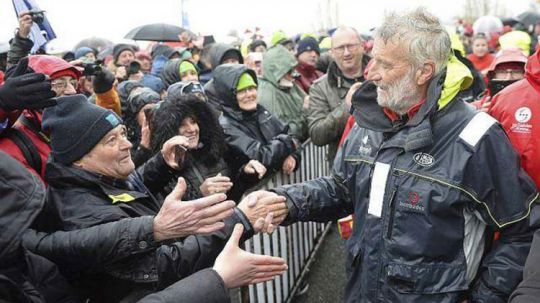
Did you know that France is the world football champion and that there are yellow vests everywhere? Did you follow the news?
No, not at all. However, I know that France won the World Cup and that there are yellow jackets. I don't know what it is, but I was told they were there every weekend.
Are you done with world tours? When you finished the round the world trip backwards, you said it was over.
When I arrived from the Vendée Globe, I was told I would probably do the next one. I said, "No, I won't do it again." After 4 round the world trips in the right direction, I didn't think I'd do it again. I did it the other way and broke the record - which I still miraculously hold. I had no idea for a moment that this race could have existed. I must admit that I was a little offended not to have had the idea before. I thought it was great!
So now I won't go around the world anymore, EXCEPT... if someone invents another great thing that will interest me again. But I don't know what we could invent. But without that, no, I won't go on a round-the-world trip again. I'm not doing the Golden Globe 2022. As a coach at the limit. My boat is for sale, I can sell myself with it.
Who are the great sailors who inspired or fascinated you?
Since I was a child, I have been rocked by the readings of Alain Gerbault, Joshua Slocum, Vito Dumas, Marcel Bardiaux, Eric Tabarly, Bernard Moitessier and all those who have gone before us. I have read all their stories. All of them have made history. Just as Robin Knox Johnston did in 1968, with a boat that was far from being the favourite, but that he chose because he had not found the sponsor to make the boat he wanted. If I had to choose at that time, I would have gone on Caruso's boat - the Italian. I had bet on him, but he had to stop to have emergency surgery. Even Joshua Moitessier's boat is not a fast boat. Of course it was going faster than Robin's, but it wasn't a beast. I had Moitessier's performance on board and I went faster than him.
